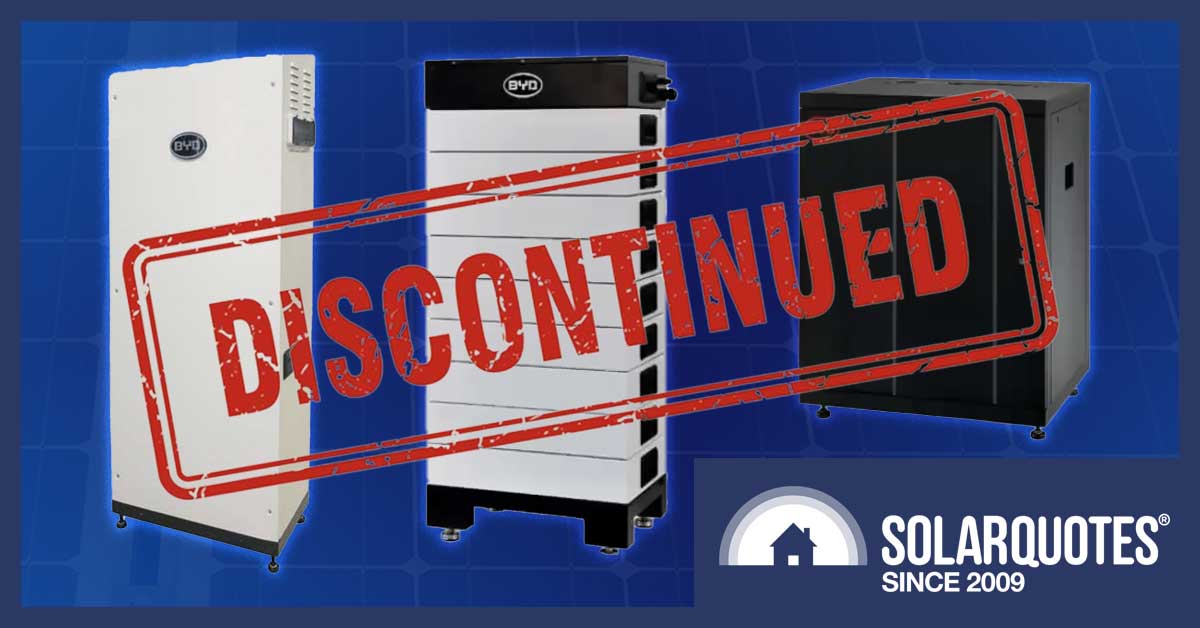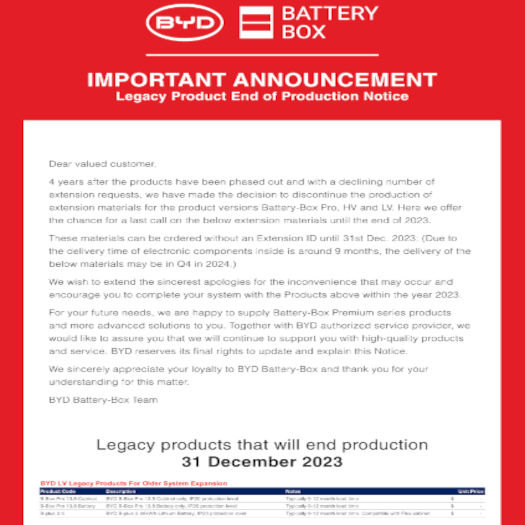
BYD Battery Box LV, Battery Box HV & Battery Box Pro
The Clock Is Ticking for BYD’s Legacy Battery Box Products
Time waits for no one, which certainly rings true with solar and battery technology. BYD is set to stop manufacturing materials for some of their older battery systems. The main items on the discontinuation list are the B-Plus 2.5kWh modules, the B-Box Pro 13.8, and the associated cabinets.
Act Now to Expand Your Solar Battery Storage
You still have a small window of opportunity to place your orders. Until December 31st, 2023, these components will be available to order, but here’s the catch – most Australian solar companies are heading into holiday mode, wrapping up for the Christmas break on December 22nd. So, in reality, this date becomes your de facto deadline for processing any last-minute orders.
This end-of-production announcement is a great example of a company putting customers first. When many have pulled the pin quietly or just announced that existing stock is all left, BYD has ensured that nobody should be left behind.
So for existing BYD battery customers, if you’re currently using the 13.8’s or 2.5’s, now is the perfect time to get on and do the expansion you’ve always been thinking about. Make the call early and ensure you get in before the dreaded Christmas rush.
Hats off to BYD for their commendable product longevity. I started using the BYD 2.5kWh modules in 2014, and remarkably, they’re still available nearly a decade later. It’s a testament to the enduring quality that BYD has consistently offered, but as we all know, all good things must eventually end. And for these BYD batteries, that end is nigh.
What About Warranty?
Without being too pessimistic, it’s worth considering that if you do buy legacy BYD batteries this year, there is a 10-year tail in terms of warranty obligation from BYD. If you suffer an unfortunate failure with the new or old batteries, the entire set may need to be replaced. Whatever your remaining warranty is may not be offered as a replacement unit (as they’re no longer made). Instead, it could be paid out pro-rata, leaving you with some unusable second-hand batteries and a small sum of cash. It’s worth quizzing your supplier about your particular installation about the warranty.

Get in before they’re all gone!
BYD BATTERY BOX IMPORTANT ANNOUNCEMENT
Legacy Product End of Production Notice
Dear valued customer,
After 4 years of production, the Battery-Box Pro, HV and LV product versions have been phased out and with a declining number of extension requests, we have made the decision to discontinue the production of extension materials for these products.
Here we offer you the chance for a last call on the below extension materials until the end of 2023:
- Battery-Box Pro extension modules
- Battery-Box HV extension modules
- Battery-Box LV extension modules
These materials can be ordered without an extension (due to delivery time of electronic components inside is 9 months, the delivery of the below materials may be in Q1 in 2024).
We wish to extend our sincerest apologies for any inconvenience that may occur and encourage you to complete your system with the Products above within the year 2023.
For your future needs, we are happy to supply Battery-Box Premium series products and more advanced solutions to you. Together with BYD authorized service providers, we would like to assure you that we will continue to support you with high-quality products and services.
BYD reserves its final rights to update and explain this Notice.
We sincerely appreciate your loyalty to BYD Battery-Box and thank you for your understanding for this matter.
BYD Battery-Box Team
Legacy products that will end production:
- Battery-Box Pro
- Battery-Box HV
- Battery-Box LV
31 December 2023
I hope this is helpful!
Ronald covered the launch of these B-Boxes back in 2017; it’s vintage Ronald and worth a click – if only for the header illustration.

 RSS - Posts
RSS - Posts



Anthony how old can your lithium batteries be before its uneconomical to add new batteries. Does it affect the new ones in a similar way to lead acid ?
Good question Richard,
If you ask GoodWe, you can’t expand a lithium battery bank. They offer a scaleable system but won’t warrant it if you want to expand later, but I think they’re an outlier.
Generally speaking, the great advantage with lithium batteries is that they are internally managed by a BMS, which means you can add increments at any time and they will behave independently of each other. So while the warranty applies to the battery when it’s commissioned, you can add more and each module will carry its own warranty. Best check with your actual supplier though.
When you design a system using lead acid, you would specify a certain size battery bank and that would be it. If you need more capacity, you sell your batteries and buy bigger ones.
The only time I’ve ever seen lead acid batteries expanded is within say, 18 months of the original installation at most. You would double the battery size, and it would involve taking half of the existing batteries out, mixing in identical new cells and then running two banks in parallel.
Imagine two sets of batteries sitting side by side. Each bank made up with an old cell, and a new cell, an old cell and a new cell, all interleaved down the line.